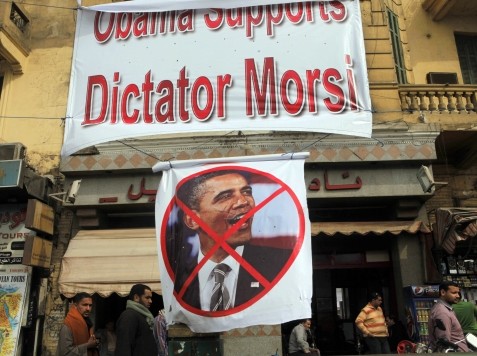Barack Obama showed colossal nerve on Monday, asserting that he has never interfered in the internal political affairs of Egypt and he’s not going to start now, despite the massive protests against Mohamed Morsi.
Obama, who is vacationing in Tanzania, said he is “concerned” about the protests and violence in Egypt, but added that Morsi’s election was “legitimate.” He followed with this piece of chicanery:
Our position has always been, it’s not our job to choose who Egypt’s leaders are. When I took a position that it was time for Egypt to transition [away from Hosni Mubarak in 2011], it was based on the fact that Egypt had not had democratic government for decades, if ever. And that’s what the people were calling for.
What Obama actually said about ousting Mubarak when he did interfere in 2011 was this:
(it) must be meaningful, it must be peaceful and it must begin now. Furthermore, the process must include a broad spectrum of Egyptian voices and opposition parties. It should lead to elections that are free and fair. And it should result in a government that’s not only grounded in democratic principles but is also responsive to the aspirations of the Egyptian people.
There was no mention of the aspirations of the Egyptian people on Monday.
Morsi has insinuated that he will not budge because he knows the White House will not bring pressure to bear, and he is correct; Obama boasted that U.S. policy toward Egypt would not budge just because of “counting the number of heads in a protest march. We’re going to continue to work with all parties inside of Egypt to try to channel this through legal, legitimate processes.”
Obama passively called for all disputants in Egypt to “step back from maximalist positions.” He added that his primary concern was the safety of U.S. diplomats and other Americans who are in Egypt.
Obama claimed that he was relieved that the seven deaths already resultant from the protests were not as many as during the ouster of Hosni Mubarak. He said he was relieved that the protests, despite causing at least seven deaths, haven’t given way to the kinds of violence seen two years ago during the overthrow of Mubarak. He bloviated that the Morsi government had:
more work to be done to create the conditions in which everybody feels their voices are heard and the government is responsive and truly representative. The way we make decisions about assistance to Egypt is based on, are they in fact following rule of law, and democratic procedures? We do make decisions based on whether or not a government is listening to the opposition, maintaining a free press, maintaining freedom of assembly, not using violence and intimidation, conducting fair and free elections. And those are the kinds of things we’re examining, and we press the Egyptian government very hard on those issues.

COMMENTS
Please let us know if you're having issues with commenting.